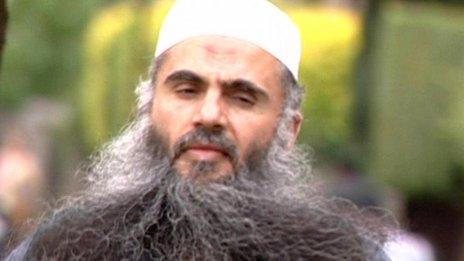Abu Qatada: Government appeal bid rejected
- Published
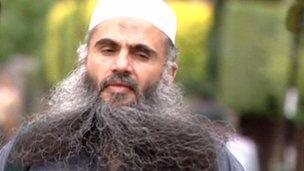
Abu Qatada's deportation: Halted over torture allegations
The Court of Appeal has refused the government permission to take its fight to remove Abu Qatada from the UK to the Supreme Court.
Home Secretary Theresa May had wanted the UK's top court to overturn a decision by a lower court to halt the cleric's deportation.
Mrs May could still petition the Supreme Court for an appeal directly.
The cleric faces retrial on terrorism-related charges in Jordan. Labour said Mrs May's strategy had failed.
Home Office minister Mark Harper said this decision was "not the end of the legal road".
He told the Home affairs select committee the government was "obviously disappointed" but ministers were committed to deporting Abu Qatada, who they still considered to be a "dangerous man".
Mrs May will make a statement to the Commons on Wednesday on the case.
Last year, the Special Immigration Appeals Commission (Siac), which adjudicates on national security-related deportations, said Abu Qatada should not be removed from the UK because his retrial could be tainted by evidence obtained by torturing the cleric's former co-defendants.
The home secretary had unsuccessfully argued to Siac she had obtained fresh assurances that would guarantee the fair treatment of the preacher on his return to Amman.
In March, the Court of Appeal upheld Siac's decision, external, saying the lower court had not misinterpreted nor misapplied the law.
The Supreme Court can reconsider Court of Appeal decisions if the justices are convinced there is a "point of law of general public importance, external".
Court of Appeal
During the Court of Appeal hearing, the government argued Siac had taken an "erroneous" view of the situation in Jordan and legal tests to assess the conditions Abu Qatada could face.
Lawyers for the home secretary said Jordan had banned torture and the use in trial of statements extracted under duress.
But in their judgement the judges said Siac had been entitled to think there was a risk the "impugned statements" would be used in evidence during a retrial and there was "a real risk of a flagrant denial of justice".
They said the court accepted Abu Qatada "is regarded as a very dangerous person", but that was not "a relevant consideration" to whether his deportation would result in breaching human rights.
Home Office minister Mark Harper: 'This decision is not the end of the legal road"
"Torture is universally abhorred as an evil," said the judges. "A state cannot expel a person to another state where there is a real risk that he will be tried on the basis of evidence which there is a real possibility may have been obtained by torture. That principle is accepted by the secretary of state and is not in doubt."
Shadow home secretary Yvette Cooper called on the Mrs May to "tell us urgently what she is going to do now to get Abu Qatada deported or tried, and keep him off our streets".
"Theresa May failed to appeal against the European Court decision last year," she said.
"It is no good the home secretary blaming the court when she didn't appeal when she had the chance. Instead the home secretary went back to square one in the British courts instead, insisting with great fanfare that her legal strategy would work.
"But she also failed to get sufficient assurances from Jordan to convince the British courts."
Abu Qatada was re-arrested and returned to Belmarsh prison in March, following an alleged breach of bail conditions, concerning the use of communications equipment at his home.
The Metropolitan Police said his breach followed an investigation into whether he was party to the publication of extremist internet material in his name.
If the police arrested and charged him with an offence in relation to that investigation, or another accusation, they could ask a judge to remand him in prison before trial.

Abu Qatada was born in Bethlehem in 1960 and spent his early life in Jordan. He fled to Pakistan in 1989 claiming political persecution and eventually arrived in the UK in 1993. Abu Qatada was part of a wave of Islamists who sought refuge in the UK during the 1980s and 90s, often exiled from the Arab regimes they were trying to overthrow.

Abu Qatada emerged as a key voice in the Islamist movement in London, which advocated strict Islamic government in Muslim countries and armed struggle against despots and foreign invaders. His preachings and ideas won him influence among Islamist groups in Algeria and Egypt during the 1990s. He was tried and found guilty in his absence of terrorism offences in Jordan in 1999.

By 2001 fears were growing about Abu Qatada's hard-line views. He endorsed suicide attacks in a BBC interview and was questioned in connection with a German terror cell. Copies of his sermons were found in the Hamburg flat used by some of the 9/11 attackers and Spanish judge Balthazar Garzon described him as the "spiritual head of the mujahideen in Britain". In December 2001, Abu Qatada disappeared and became one of the UK's most wanted men.
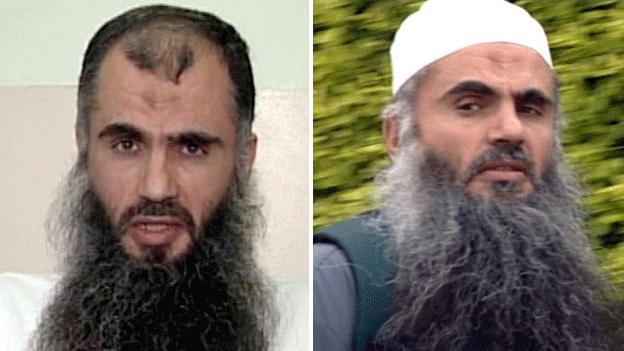
In October 2002 Abu Qatada was arrested and detained without charge. He was released in 2005 and put under strict house arrest, but months later was arrested under immigration rules and moves began to deport him to Jordan to face retrial on the charges he had been convicted of six years earlier. In 2007 he lost his immigration case, but the Court of Appeal later ruled that deportation to a regime which uses torture - ie Jordan - would breach his human rights.
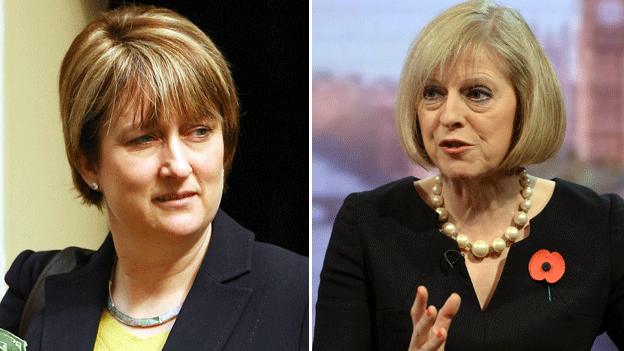
The Court of Appeal ruling was overturned by the Law Lords in early 2009, and the then Home Secretary, Jacqui Smith (L), signed a deportation order. Abu Qatada then appealed to the European Court, which eventually ruled that he could not be deported while the risk of torture remained. In 2012 Home Secretary Theresa May (R) pressed ahead with deportation, but this was blocked amid a row over the appeal deadline.
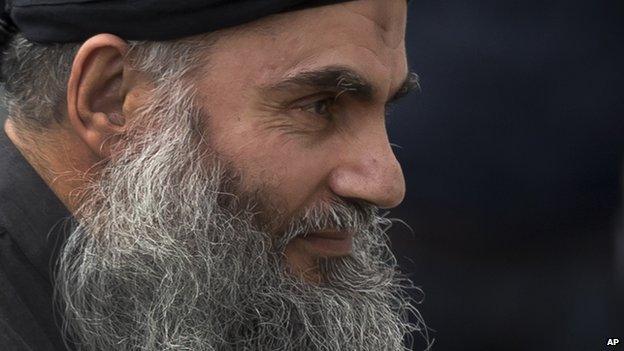
In November 2012 Abu Qatada was released from prison once more after a UK court backed his appeal on the grounds that witness evidence obtained by torture could be used against him at trial in Jordan. That was a disastrous blow to the Home Office because it meant the only way the deportation could happen would be if Jordan changed its system to ensure torture-tainted evidence could not be used.
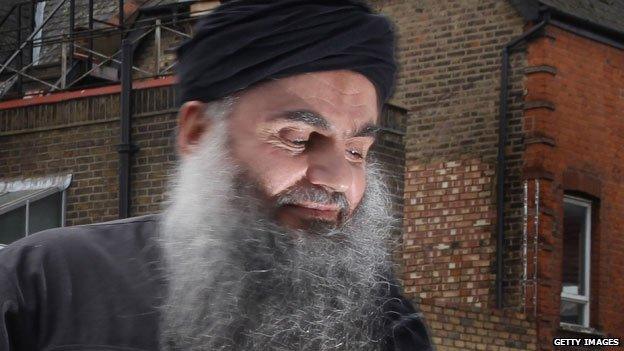
Abu Qatada was then returned to prison on 9 March 2013 after an alleged breach of his bail conditions - but this deportation was still blocked. Weeks later, Home Secretary Theresa May announced a new UK-Jordan treaty to improve co-operation in criminal investigations. That treaty included a guarantee of a fair trial free of torture-tainted evidence for anyone sent back to Jordan. Abu Qatada's lawyers announced he would now return to Jordan.
- Published18 April 2013
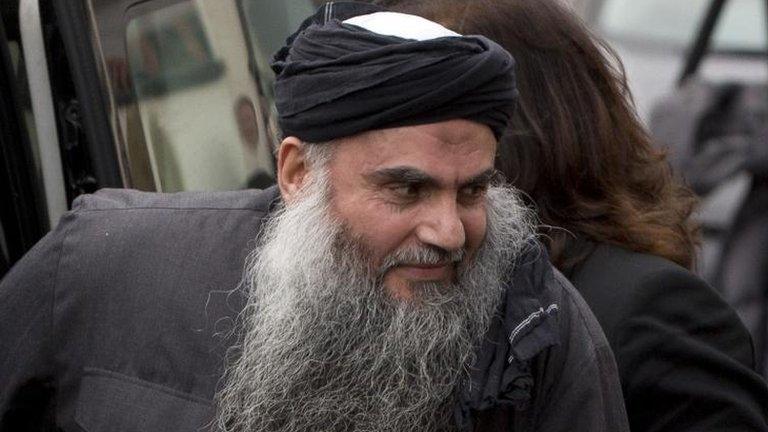
- Published27 March 2013

- Published10 May 2013
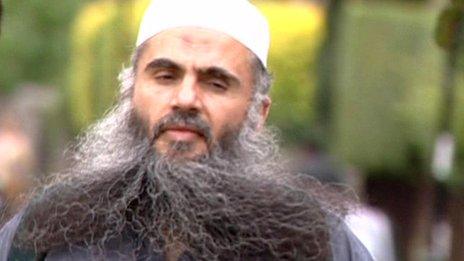
- Published26 June 2014
